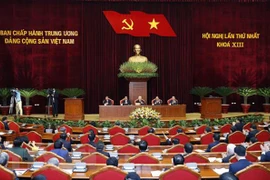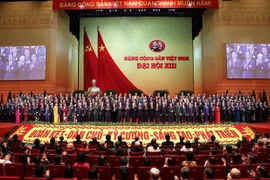The documents of the 13th National Congress notedthat foreign affairs in all three pillars – Party’s external relations, Statediplomacy and people-to-people diplomacy – have contributed to remarkableachievements of the country, Trung said.
Vietnam has improved the effectiveness, and furtherexpanded and deepened relations with many international partners, he said,noting that the country has so far increased the number of strategic andcomprehensive strategic partners to 30, including all permanent members of theUnited Nations Security Council (UNSC) and most members of the world’s majorpolitical and economic blocs, especially neighbouring countries.
Vietnam has also maintained territorial integrity and nationalsovereignty and made many concrete steps forward in settling border issues. Vietnamhas completed border delimitation for over 5,000km land borderline it shares withall three neighbouring countries – Laos, Cambodia and China, he noted, addingthat border demarcation and marker planting work has completed for the borderswith Laos and China while it has been 84 percent done along the border withCambodia.
The country has made the most of the opportunitiesbrought by international integration to bolster socio-economic development, asseen in attracting foreign investment, boosting trade and tourism and accessingscientific-technological advances while maintaining national independence,particularly self-sustenance in economy.
According to the Deputy FM, over the previous years,Vietnam has also promoted cultural diplomacy to promote the countryinternationally while absorbing the essence of global cultures. Diplomacy alsohelped address arising problems relating to overseas Vietnamese, thus protectinglegitimate rights of Vietnamese people overseas.
The documents affirmed Vietnam’s consistent foreignpolicy of independence, peace, cooperation and development; being a responsibleand trusted friend and partner of the international community; promotingmultilateralisation and diversification of external relations; and ensuringnational interests based on international law and equality among countries. Thediplomatic sector is assigned the task of playing the pioneering role increating and maintaining a peaceful environment favourable for national renewaland development, thus enhancing the country’s position.
The documents clearly state that foreign affairs mustbase on three pillars: Party’s external relations, State diplomacy andPeople-to-people diplomacy.
One of the new points in the documents focuses onimproving the effectiveness of and deepening bilateral relations and enhancingmultilateral diplomacy.
Regarding the protection of border territories,sovereignty, sovereignty of sea and islands, Deputy Minister Trung said thegoal of Vietnam's foreign policy is to maintain a peaceful and stableenvironment for the country's development, to make the best use of favourableconditions for the Doi Moi cause and socio-economic development, thus elevatingthe position of Vietnam in the international arena and contributing to thecommon work of the international community.
The most important goal is to firmly and persistently maintainnational independence, sovereignty and territorial integrity. This goal hasbeen put at the top position in the foreign policy of Vietnam throughout manyParty congresses as well as at the 13th Congress.
On the issue of sovereignty protection, including landand sea border and territories, many very important tasks have been and arebeing carried out, involving the implementation of the agreements signedbetween Vietnam and China, Laos and Cambodia relating to border demarcation andmark planting; the management of border marks and border gates, and others. Accordingto the official, Vietnam both promotes socio-economic development andcoordinates with countries sharing the land borders to combat all forms ofcrime, ensuring security and safety in border areas.
The Deputy Foreign Minister suggested intensifyingconnectivity between border regions with other regions nationwide and upgradeinfrastructure there.
For the border at sea, Vietnam and other countries share theEast Sea and other international waters, in accordance with the 1982 UnitedNations Convention on the Law of the Sea (UNCLOS), he said, noting that underthe convention, countries bordering the East Sea have the same interests andcooperation.
Vietnam’s consistent policy is to work with countriesinvolved to address disputes in the East Sea peacefully in conformity with theUNCLOS and international law, stated Trung./.





























